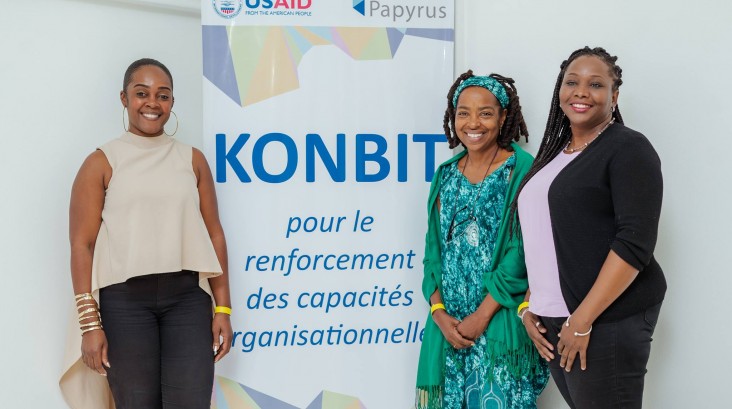Speeches Shim
Haitian Konbit Project Builds Solid Foundations
Driving locally led development
Building the capacity of local organizations is central to the goals of USAID’s New Partnerships Initiative. Read how one Haitian company elevated local leadership and equipped partners in Haiti with the resources and skills to be effective agents of change in their community.
Fondation Paradis de Indiens (FDPI) is a small Haitian network of 10 primary schools that came to USAID seeking support to fulfill its mission. They facilitate access to education while improving their families’ socio-economic status through integrated programs. Though powered by an important mission, the organization faced challenges with ramping up their back office and the compliance requirements of implementing restricted funds.

Thanks to the USAID-funded Konbit project, run by its Haitian partner Papyrus S.A., FDPI was not left to its own devices to address these common organizational roadblocks. As a part of FDPI’s involvement in Konbit, experts played a significant role in providing training and support through institutional restructuring and innovative problem-solving. As a result, FDPI successfully defined roles and responsibilities for effective decision-making, updated internal controls and financial systems, and became more accountable to donors and stakeholders.
“Konbit has certainly strengthened the momentum driving locally led development. We are a growing pool of Haitian organizations that are more competitive, understand the value of collaboration, and embrace our role as actors for change,” said Konbit Chief of Party Melissa Padberg, who has been with the project since its inception.
Konbit will wind down in December after five years of delivering mentoring, training and other services designed to build capacity among local private sector and civil society organizations.
“The good news is the program will leave a solid foundation of Haitian leaders who have honed their skills and improved management practices in Haiti,” said Ms. Padberg.
Konbit is a Haitian Creole term for “working together.” As Padberg said, “This is what the program is all about—people in the community coming together for a greater outcome.
“We see a positive movement building and have incorporated certain sustainability measures to keep the initiative going.”
Padberg is a Haitian-American who completed her education in the United States and has spent most of her life in the Caribbean. Although she says the project had its challenges, Papyrus is extremely pleased with its progress and results.
“Konbit is a unique project and it was difficult in the beginning for our partners to understand the mission and goals of the project. However, since the project was being implemented locally, we were able to quickly gain traction and begin delivering capacity development services”
Papyrus rolled out robust training and mentoring programs through Konbit to help foster organizational leadership and hone sustainable skills.
“It helped that a Haitian company spearheaded the program and that our commitment to our partners was for the long haul. It was a process of gathering the community around us and mobilizing them around common goals and objectives,” Padberg said.
The project evolved during the five-year USAID contract period with distinguishing elements focused on both traditional back-office training and two categories of mentoring.
The mentoring program, “Expert Konbit,” modeled after Apple Inc.’s Genius Bar, served as an opportunity for participants to receive direct support. In addition to many local experts, USAID Mission staff volunteered their expertise to answer questions on topics such as; award management, roles and responsibilities and communication.
“The other mentoring service was a high-level, ongoing consultation for Konbit partners. With this “Helpline Service” we paired Haitian organizational leaders with international compliance experts so they could receive targeted assistance and follow-up support,” Padberg said.
In terms of lessons learned throughout the program, Padberg prioritized sustainability. “Capacity development is a long-term game, and investment needs to be there for the long haul, as does the commitment of the local partners.
“The partner’s commitment is probably the most important indicator of success in capacity-building interventions. Offering advisory services and becoming a hub of organizational development is only a foundation. We believe 75 to 80 percent of the success comes from the commitment, investment, and accountability of the partner."
Padberg said her team of 10 staffers feels the same enthusiasm for the project they had since the day it began in 2015, even though at times it has been a challenging journey.
“What has kept me encouraged has been the cooperation of the local organizations and the fact they want to grow their businesses and organizations. Even with the many challenges in Haiti, these businesses are committed to their communities.”
Though the project itself will close with the end of the year, the spirit of Konbit will live on through the values instilled within the Haiti Mission, leaving behind a commitment to sustainable, locally led development.

Comment
Make a general inquiry or suggest an improvement.